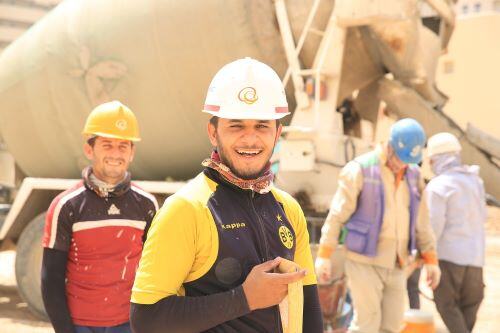Listen to Audio Version:
Josh Santo is Senior Product Marketing Manager at Parsable, a company digitizing frontline manufacturing work instructions to improve operations and sustainability, and host of Conquering Chaos, a podcast casting a spotlight on the newest and best practices of our manufacturing leaders. In a recent episode, Josh hosted Wendy Pease, Rapport International’s President and Owner, who shared advice and best practices for global business owners in the manufacturing industry, focusing specifically on how language services work to attract and retain non-English speaking customers, vendors, and employees.
Here are highlights from the interview—valuable information for anyone selling or planning to sell internationally.
A New Approach: Leverage Diversity to Tackle Workforce Issues
Supply chain and workforce issues are top of mind in manufacturing. The industry is bracing for the upcoming retirement of experienced workers, making the recruitment and retention of new and fledgling workers a priority.
Why should US companies appeal to foreign-born workers? According to the Bureau of Labor Statistics, as of 2023 immigrants accounted for 18.6% of the US workforce and at least 19% – almost 1 in 5 – of the manufacturing labor force, numbers that continue to grow steadily year over year. And the numbers are consistently higher within other industries, indicating a huge opportunity for manufacturers:
- Agriculture: around 73% of all agricultural workers are immigrants
- Construction: Over 30%
- STEM (science, technology, engineering, and mathematics): 25%
- Healthcare: 28%
Consider this: Many immigrants possess advanced degrees but cannot work in their original professions due to limited English language skills, making them an untapped resource for finding highly qualified personnel.
So, how do you make your company more appealing? How do you attract, engage, and delight members of foreign-born communities? And what does that mean for your workforce and company in the short- and near-terms?
As a best-case example, Wendy describes the plan executed by Boston Centerless, a Woburn-based manufacturer that is consistently “nearly fully staffed,” a success realized by engaging local Spanish- and Vietnamese-speaking communities. Rather than hiring and teaching English, the company hired and trained employees without English language skills by translating relevant material, created a welcoming workplace, then recruited within those and other local, non-English speaking communities.
The company’s language strategy includes simple and practical steps to attract, engage, and delight within a reasonable budget for companies of any size. For example:
1. To attract:
- Translate informational brochures.
- Provide a QR code to brochures in various languages.
- Arrange for bilingual, telephone, and live interpreters for initial interviews.
2. To engage:
- Create manuals in-language so that your mission is translated correctly and conveys your goals. For example, Boston Centerless strives for “precision manufacturing” rather than creativity and seeks a detail-oriented workforce.
- Illustrate essential information like safety and instructional signs.
- Support ongoing training programs with transparent tracking – every worker knows who is trained on which equipment.
- Maintain equity in training and promotion.
- Deliver gratitude and rewards for successful projects. At Boston Centerless, a wooden figure called TIMWOOD holds sticky notes announcing even the smallest successes.
3. To delight:
- Raise a flag for every country represented, an active reminder of the diversity there.
- Hold a holiday potluck where workers bring food from every country.
- Strive for promotion from within to find bilingual managers.
- Offer English learning as a benefit, not a requirement.
- Create a referral bonus program.
The talent supply chain is local, so these efforts combine to establish a culture of representation in which every individual feels heard and included and is also seen as an ambassador of their native culture. These individuals then become advocates within their local communities, and ultimately, when staffers find themselves working with relatives and other known people, it fosters a sense of loyalty, as opposed to feeling like a part of a “disposable workforce.”
Josh and Wendy agree that, in a sense, “manufacturing has a marketing problem” when it comes to hiring. Think instead of your main requirements – “detail-oriented workers” is a good example – then cast a wider net. Translating critical information to which everyone needs access proves that a company values its employees and remains committed to employee safety and personal development. And it’s a budget-friendly effort because it involves content that can be translated into easily consumable amounts.
Innovative Solutions: Leverage Translation and Cultural Understanding
Wendy describes how working with a high-quality agency staffed with human translators and interpreters creates a scalable and repeatable process for an outreach campaign in any language. It’s safe to say that every employee in every industry is looking for a safe workplace, engaging work, and social interaction. To accomplish that goal, her best advice is to translate, provide interpreting services, and pay attention to cultural details; the process will undoubtedly help you stand out from your competitors.
Look for people who will act as “cultural conduits” to the local community. Studies show that companies with a diverse workforce outperform their competitors by 20-30%, seeing higher revenues, better production, and better managing market fluctuations. Diverse viewpoints also drive creativity and innovative problem-solving, all of which help " conquer the chaos” of manufacturing while realizing financial gain.
A simple way to get started is to reach out to local, influential community leaders (Russian math teachers, Chinese language schools, local community centers) to attract non- or limited English speakers within the community. Next:
-
Stay curious and ask! People want to be asked about culture rather than living through uncomfortable situations.
-
Embrace la différence! Pay attention to body language and responses. Slow down: talk slower, confirm understanding, and ask questions in different ways.
-
Find a high-quality language service partner for your translation and interpreting needs. HR content, like sales and marketing material, often requires more attention than a simple word-for-word translation. It must appeal to differing mindsets and backgrounds – humor, for example, can play a big part and isn’t easily translated.
-
Be prepared to facilitate cross-lingual, spoken communication – video-on-demand interpreting services, telephone interpreting, and in-person interpreting.
-
Entice buy-in from corporate – open up “shop floor” culture to make it welcoming.
These best practices aim to be multicultural and cross-generational—younger people don’t want to read a lot of text, for example—and prove your commitment to combatting an “us v. them” workplace culture. Regardless of industry, healthy, forward-looking individual mindsets of leaders are infectious. Leading with gratitude and promoting work/life balance creates a centered, appreciative, and grounded workforce. For best results, partner with a language services provider that appreciates and upholds your philosophy.
About the Host and Guest
Josh Santo is the Senior Product Marketing Manager at Parsable. The company’s Connected Worker® product line, which analyzes frontline operations to improve productivity and sustainability, is supported in 18 languages. He also hosts the Conquering Chaos podcast, which features manufacturing leaders making an impact.
Wendy Pease is the owner and President of Rapport International, a language services company that provides high-quality written translation and spoken interpretation in over 200 languages. She’s the author of The Language of Global Marketing, host of The Global Marketing Show podcast, and an expert speaker on connecting people across language and culture. She holds a BA from Penn State and an MBA from Tuck School at Dartmouth College.
Rapport International specializes in multilingual communications, providing language translation and interpretation services that are accurate and culturally appropriate. We use the right voice and the correct terminology to avoid liability, customize services to your needs, and deliver on time and within your budget. With our 100% satisfaction guarantee, you can trust that it’s done right. Contact us today if you would like more information or to get a free quote.
Popular Posts
Popular industry news, interviews, technologies, and resources.
















